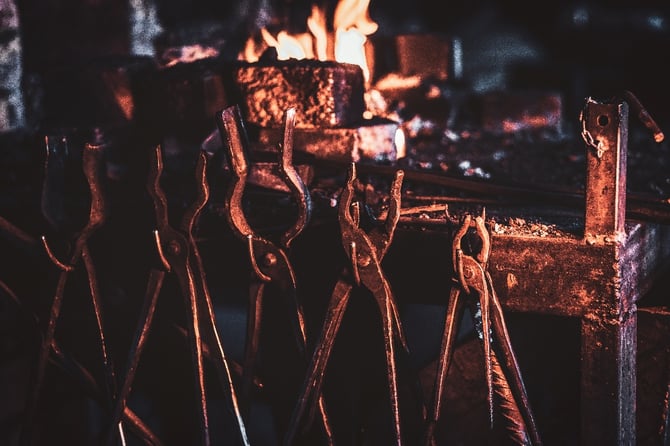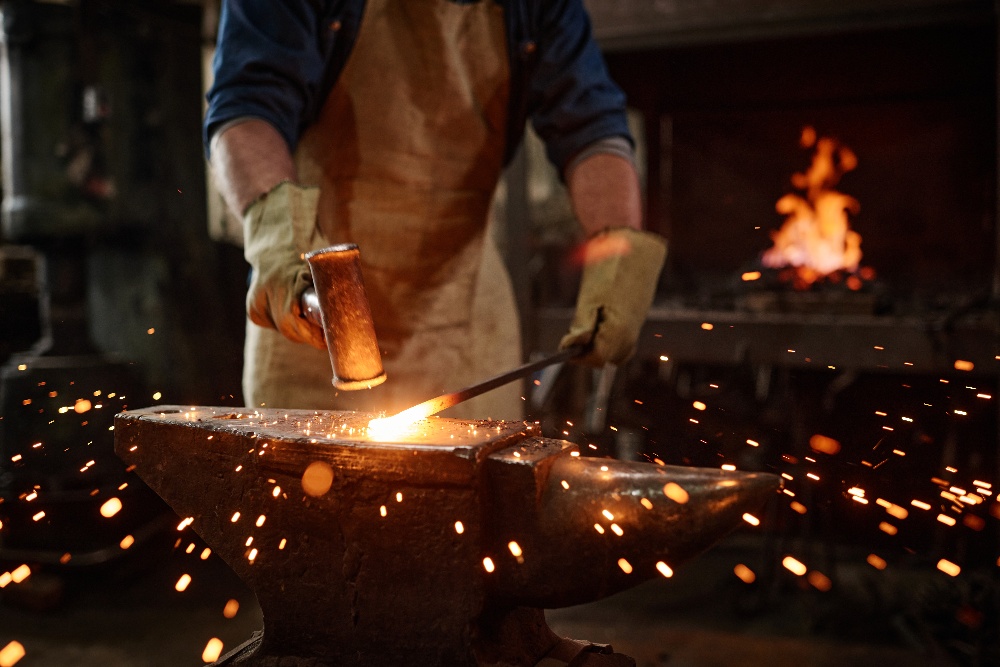JPB Système's workshops recently opened their doors to the teams from Union des Forgerons, presenting a great opportunity to discuss continuous improvement projects and to witness the latest features developed by KEYPROD in action. This meeting was a blend of tradition and innovation at a factory known as the "Vitrine Industrie du Futur".
This event has inspired us to share more about the craftsmanship of forging: this ancient industry that merges with innovation.


Heritage and tradition
The age-old practice of forging dates back to prehistoric times when our ancestors used stones to shape metals. Over time, the Bronze Age introduced more advanced techniques. Blacksmiths, like alchemists, manipulate flames to melt, cast, and shape metals, thus creating more durable tools. The Iron Age then saw the emergence of large-scale forging through the use of blast furnaces. During the Middle Ages, medieval blacksmiths refined these techniques, creating complex armors, weapons, and tools.
With the advent of the Industrial Revolution, forging underwent significant changes. Machines powered by steam and later by electricity allowed the development and industrialization of manufacturing processes.
Today, forging combines tradition and innovation. Contemporary blacksmiths use modern equipment while preserving the ancestral techniques that centuries have not erased.
The history of the forging industry is deeply rooted in tradition but has also adapted to technological advancements to remain a cornerstone in the manufacturing of metal parts. This industry plays a vital role in key sectors such as aerospace, automotive, energy, and construction. The art of forging in France has evolved over generations from traditional artisanal methods to more modern industrial processes.

Forging melded with innovation
Behind the scenes of anvils and flames, the forging industry is transforming under the impetus of modernization and actively adapting to Industry 4.0 by integrating advanced technologies such as:
- Automation, through the use of collaborative robots, frees craftsmen from repetitive tasks, preserving their expertise for more complex aspects.
- 3D modeling and simulation have become essential tools, allowing blacksmiths to create virtual prototypes, optimize designs in real-time, and reduce development cycles.
- Internet of Things (IoT) transforms the forge into a connected environment where machines communicate with each other. Smart sensors monitor equipment in real-time, identify stops, and optimize performance, promoting transparent and efficient production.
- Forging technologies, like high-pressure hot forging and isothermal forging, combined with control algorithms, allow for better dimensional precision and offer the possibility to customize products.
- Collection and analysis of massive data (Big Data) transform production management, enabling measurement for improvement.
- Training modern blacksmiths in the use of new technologies is crucial for acquiring the digital skills needed to face the challenges of a future forge.
Through these technologies, the forging industry successfully reconciles tradition and innovation, creating a synergy where artisanal expertise harmonizes with digital advancements to shape a forge of the future.

L'Union des Forgerons, an experience forged over a century
Founded in 1912, Union des Forgerons is a leading institution in the field of free forging of ferrous and non-ferrous metals. With over a century of experience, the company has always innovated to thrive.
Union des Forgerons' commitment to quality and innovation is exemplary. Continuous investments in the pursuit of perfection, constant staff motivation, and the ongoing quest for quality have contributed to the company's longevity and renown.
Turning towards Industry 4.0, Union des Forgerons has opted for production monitoring solutions based on the Internet of Things (IoT). This technological advancement allows the company to monitor its equipment in real-time, identify production stops, and optimize its workshop to increase efficiency. This is a new step towards innovation for Union des Forgers, strengthening its production processes.
At the heart of this digital transformation is KEYPROD, a unique IoT solution that transforms machine vibrations into production indicators. Developed by JPB Système, KEYPROD assists Union des Forgers in its quest for operational efficiency and demonstrates its ability to adapt to the specific needs of all industrial sectors.
A futuristic vision for the forging industry, perfectly combining artisanal tradition and technological advancements, to which we are proud to contribute!